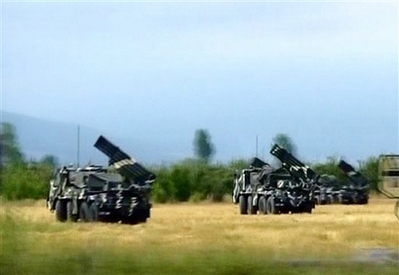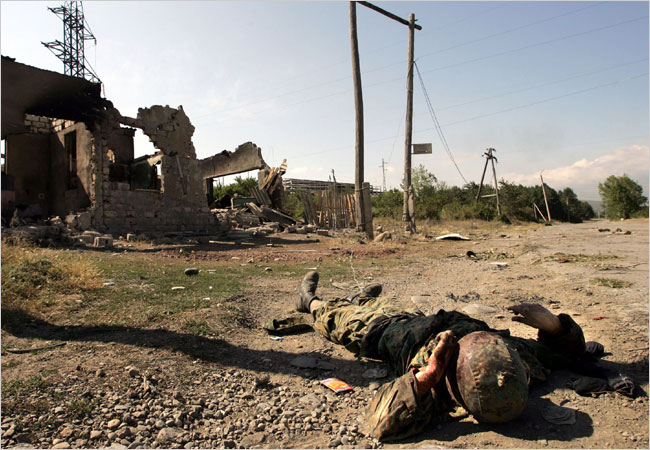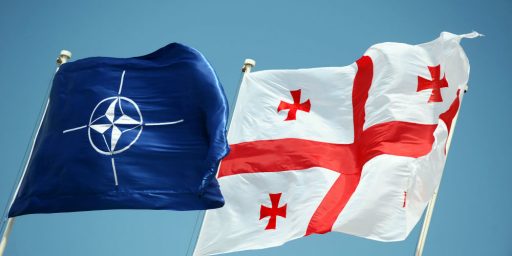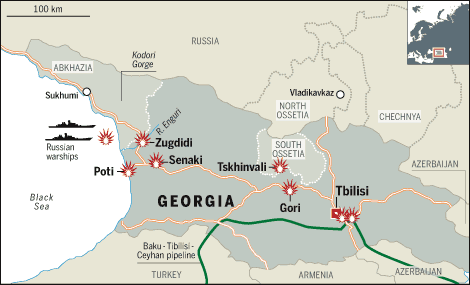The Big Questions on the Situation in the Caucasus
SWJ Blog has an excellent roundup of newspaper articles and commentary on the situation in South Ossetia and I’ve said what I’ve got to say about the situation here so I won’t bother recapping either of those things here. However, I do think that the situation in the Caucasus raises a number of interesting questions.
First, why did the Georgians move against South Ossetia now? Did they have reason to believe that Russia wouldn’t respond? Had the Russians sent some sort of signal? Did the Georgians receive some sort of assurances from the United States?
Second, what next? There are conflicting reports about what’s going on:
U.S.-allied Georgia called a unilateral cease-fire — “We are not crazy,” said President Mikhail Saakashvili — and claimed its troops were retreating Sunday from the disputed province of South Ossetia in the face of Russia’s far superior firepower. Russia said the soldiers were “not withdrawing but regrouping” and refused to recognize a truce.
The Russian language press is now reporting that Georgian forces are leaving or have left South Ossetia.
Both Sen. Barack Obama and Sen. John McCain have called for an end to the hostilities:
HONOLULU, Aug 9 (Reuters) – U.S. presidential candidates Barack Obama and John McCain stepped up their criticism of Russia’s military activity in Georgia on Saturday, calling for Moscow to withdraw its forces and the international community to facilitate peace talks.
McCain, a Republican senator from Arizona who has made foreign policy and national security the centerpiece of his campaign, said he spoke to Georgian President Mikheil Saakashvili on Saturday, their second conversation since the crisis erupted.
Obama, on vacation in Hawaii, said he had also spoken to Saakashvili and U.S. Secretary of State Condoleezza Rice.
A quick scan of the foreign language news journals has failed to reveal any particular interest in intervening on behalf of the Georgians on the part of the Europeans and, while nearly everybody is calling for an end to the hostilities, things actually seem to be escalating. For example, Ukraine recently suggested that it might bar Russian ships involved in the conflict from returning to their bases:
KIEV, Ukraine – Ukraine warned Russia on Sunday it could bar Russian navy ships from returning to their base in the Crimea because of their deployment to Georgia’s coast.
Ukraine’s Foreign Ministry said the deployment of a Russian naval squadron to Georgia’s Black sea coast has the potential of drawing Ukraine into the conflict.
“In order to prevent the circumstances in which Ukraine could be drawn into a military conflict … Ukraine reserves the right to bar ships which may take part in these actions from returning to the Ukrainian territory until the conflict is solved,” said the statement which was posted on the ministry’s Web site.
Finally, what does this mean for NATO? The very least thing I think we can expect from the events of the last few days is that NATO’s eastward expansion will have been halted for the foreseeable future. It’s hard for me to imagine the United States let alone France and Germany intervening militarily to defend Georgia from Russia with or without NATO membership. Indeed, Europe’s increasing dependence on Russian natural gas makes me wonder if Germany in particular would be interested in blocking Russian actions under any circumstances.






My sense is that the Russians were eagerly waiting for a misstep, something that could be painted as a provocation, by Georgia. Having gotten the excuse they wanted, or close enough thereto, they’ve now pounced into the vacuum left by the European NATO nations who refused America’s push to include Georgia among NATO’s new Eastern European members. The vacuum is filled with Soviet armor and air support now, and there’s no indication yet that the Western European NATO allies have the good sense or decency to acknowledge that they’ve been humiliated for practically inviting the Bear to act like a Bear.
I was hugely amused, but actually considerably frightened beneath that, in listening to Gov. (and former Clintonista UN ambassador) Bill Richardson (D-NM) sputter incoherently about how Barack Obama is going to fix all this. “Diplomacy!” is the key, diplomacy that is simultaneously friendly and relationship-building while tough and muscular! As if it’s all about charisma. As if this is junior high school. As if Putin and that Russian armor give a rat’s ass about how many crowds chant The Chosen One’s name in Berlin. Yet this — and a press release from the Obama campaign attacking a McCain adviser for being a lobbyist for American ally Georgia and otherwise parroting the Moscow party line — is what passes for an éminence grise among Democratic foreign policy advisers today.
The McCain camp needs to bring back the Bear in the Woods commercial from 1984.
(I ought to have mentioned that I was watching Richardson this morning on ABC News’ “This Week,” with Jake Tapper ably filling in for George Stephanopoulos. In their “Roundtable” panel discussion later in the show, Torie Clarke was openly contemptuous of Richardson’s performance.)
Diplomacy may not get Russia out of Georgia, but that chanting crown in Berlin may be enough to get Germany in. Diplomacy with out allies can be just as useful as diplomacy with out opponents.
And what exactly is McCain’s plan for dealing with the situation? Run commericals? Maybe he can work Paris Hilton into the mix…
“The vacuum is filled with Soviet armor and air support now, and there’s no indication yet that the Western European NATO allies have the good sense or decency to acknowledge that they’ve been humiliated for practically inviting the Bear to act like a Bear.”
I don’t think they feel humiliated, so much as relieved that Georgia didn’t get in in the first place. Because if Georgia had got in, it would have been even more likely to go on the offensive and then if the Russians had called our bluff, we’d have been stuffed up the backside.
“And what exactly is McCain’s plan for dealing with the situation? Run commericals?”
Exactly. Where’s the beef? The answer, of course, is that there isn’t any.
Dave, I always enjoy your commentary, but let me pick away at this a little (I’m open to being convinced by you).
You seem to focus a lot on the supposed lethargy of the EU states. I’m no great fan of the EU and, yes, I think the Germans can be pretty soft. But what’s the substantive difference between the British and French and the US on this (short of wanting Georgia in NATO or not)? Both the UK and France have backed the USA up at the UN and both countries have released statements that are no less punchy than those coming out of the US administration.
Or should they be doing more than the USA? Well, Georgia is arguably more the Europeans’ back yard than it is the USA’s. But then:
– The USA is largely responsible for arming the Georgians
– The USA is largely responsible for training the Georgians
– The USA pushed hardest for Georgian NATO membership
– The USA appears to have either a) bungled by misjudging the Georgians’ intentions and letting the Georgians think more help would be forthcoming than could possibly be provided or b) tacitly tipped the Georgians the wink, failing to anticipate it all going wrong [I consider option a) much the more likely]
So, please, substantively, how is the problem here that Western Europe isn’t doing enough?
That’s pretty much my position. I’ve felt the same way about Bosnia and Kosovo. If I had my way the U. S. would be doing considerably less. Given the lack of action on the part of the Europeans, would that be prudent? That’s not a rhetorical question, it’s a genuine one.
“That’s pretty much my position. I’ve felt the same way about Bosnia and Kosovo. If I had my way the U. S. would be doing considerably less. Given the lack of action on the part of the Europeans, would that be prudent? That’s not a rhetorical question, it’s a genuine one.”
I think your position, framed in that way, is a perfectly consistent one. The only thing is that, as we stand, that isn’t how things have turned out.
I think if we’re looking at the big picture, neither side is particularly blameless. On the one hand, the EU doesn’t shoulder its share of the burden. On the other, it’s not very sustainable for the USA to go steaming ahead on a string of issues against the wishes of its European partners and then when it goes wrong, complain that the Europeans aren’t prepared to go to the wall over something that they never wanted to buy into in the first place.
Actually, on a string of issues – Bosnia, Afghanistan, etc. – I’m far more sympathetic to the US position vs the European one. Far more sympathetic. On this particular one, not quite so much.
You must either think that the Europeans want (or should want) the same things as the U.S., or you don’t care what they want. Because that sounds an awful lot like you want them to do what the we want done, so that we doesn’t have to do it ourselves.
NATO and the UN are useful, but we can’t forget that the only people that want us to be happy with foreign events is us. And even with the UN and NATO, it’s always going to be that way. What real incentive do France and Germany have for defending South Ossetia?
Michael asked,
Surely you jest. Anyone with even a knowledge of the 20th Century obtained from comic books can surely answer that question.
One-third of Germany, including its once and present capital, Berlin, was effectively a province of the Soviet Union only two decades ago, and it had been in that condition for over four decades.
France, having been overrun by the Germans in 1884 and then nearly again in 1914-1918, was overrun by and a client state of the Nazis for half a decade in the middle of the century.
The Russian concept of the “near-abroad” includes client states that they control entirely, adjacent to which are states that they merely terrorize. The fundamental founding purpose of NATO was to push back against that looming presence, to create a deterrent sufficient to keep the Bear and its tanks on their side of the borders.
As recently as the early 1990s, the relevant borders within which the Bear would hereafter be kept were believed to include Georgia’s. The European NATO allies backed off from formalizing that through treaty, which the Bear interpreted as them bathing Georgia with A-1 Steak Sauce.
Anthony wrote,
Yes, precisely, but that’s not inconsistent at all with what I said, which was that they ought to have (but lack) the good sense to be humiliated. They should simply go ahead and move the capital of the EU to Vichy.
anjin-san wrote,
The same as Harry Truman’s and Ronald Reagan’s. To start with, you bring moral clarity and consistency to your statements about the situation, and you damn sure don’t condemn the invaded along with the invaders, which was Obama’s first response.
But while that’s a prerequisite, it’s not sufficient. Diplomacy is never about just words, or even mostly about words, but about interests. You make it in Western Europe’s interests to get on board. Again, the fundamental premise of NATO has always been that America would stay involved in preventing war in Europe if, but only if, the Europeans stepped up to their own responsibilities in a genuine partnership. We’re not going to make war on France or Germany to make them make war on Russia or, more realistically, to make them station significant trip-wire forces in, say, the Ukraine. Ultimately, our only way to induce their cooperation is to threaten, credibly, to take our football and go home across the Atlantic. In the mid-1980s, that threat was sufficient, ultimately, to persuade reluctant and cowed European states to go along with Reagan in countering Soviet intermediate range ballistic missiles, which was one of the final strategic showdowns of the Cold War.
Talk-talk and “building strong relationships” and diplomacy didn’t get McCain out of the Hanoi Hilton. American B-52s and the mining of Haiphong harbor did, or more precisely, they made the North Vietnamese realize it was in their interest to take the deal then being dangled by Nixon. They weren’t counting on the particular Watergate-induced windfall that would result in a gutless, spineless Democratic Congress as early as 1974 that would break our support commitments to South Vietnam so quickly, but they certainly knew how to exploit that accident of history, just as the Russians are now exploiting the Western Europeans’ failure to grant Georgia full NATO membership.
Obama makes Neville Chamberlin look positively prescient.
Dr. Joyner, do I misremember, or were you a young officer commanding some of those tripwire forces stationed in West Germany pre-Desert Storm near the end of the Cold War? Did you have any doubt then or now that it was the presence of American forces stationed there which kept the Russian tanks from racing across the Fulda Gap, and the resulting security which made possible a Western Europe not completely overshadowed by the constant threat of Soviet invasion?
Anthony, I also ought to have said, re your comment that I quoted above, that I do not believe the Russians would conceivably have attacked targets in Georgia if Georgia had been admitted to NATO. This isn’t the “South Ossetia crisis,” but the Georgian crisis.
You sure about that??? I think it was 1870.
I think McCain abandoned any claim to those things when he backed Bush’s torture policies… Actually, our entire country has pretty much abandoned any moral high ground in the last 8 years.
All this talk about “The Bear” is interesting. Too bad we have been ignoring The Bear for all these years while Bush made war on a country that did not threaten us…
So very typical, anjin-san: Given a direct answer to your previous rhetorical question, you change the subject. America is EEEEE-vil. Go sulk with Michelle Obama until the Chosen One’s coronation, please.
DC Loser, you’re right: The Franco-Prussian War was 1870-1871, I misremembered.
You don’t have an interest in your safe, only the contents of your safe. If for whatever reason you felt that your safe was either ineffective, or unnecessary, you wouldn’t so much care about its integrity.
Beldar…
Do torture and gulags jibe with your vision of the American Way? Cause I kind of equate them with Fascism and Communism. Or do you feel that we don’t actually have to practice our principals, just wear flag pins?
I don’t think American is evil, but we are a nation of human beings, creatures who are quite capable of doing evil from time to time. This has been one of those times. All that is required for the triumph of evil is for good men to stand by and do nothing…
This raises a question – why do we even give a rat’s ass about all of these post-Soviet Bloc countries post-Soviet Union? It’s not as if there is a dire threat that Russia is going to suddenly invade them all again; it barely has the capability to credibly occupy Georgia, never mind threaten all of its former “clients”. Caucasus oil isn’t one of the biggest sources of US oil – we get vastly more from Canada, Mexico, Saudi Arabia, and Venezuela than the Caucasus sources. Iran is only a threat as long as we have large numbers of troops sitting in Iraq, unless you consider Israel’s safety to be a prime interest of the United States.
I’m honestly wondering why we even pursued this strategy we started doing at all – perhaps we should have simply let the Europeans struggle to handle it, and focused on humanitarian issues elsewhere where it could have mattered more (like Rwanda in 1994).